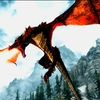hiithpaarthurnaxRemoved.
Uh, it's still there
EDIT: 20 pages!
Hmm, that seems to happen every now and then, not sure why.
We may have to start a new thread soon!
A community for the dragon language of The Elder Scrolls V: Skyrim
 paarthurnax Administrator June 17, 2014 |
hiithpaarthurnax Hmm, that seems to happen every now and then, not sure why. We may have to start a new thread soon! |

hiithpaarthurnaxRemoved.
Uh, it's still there
EDIT: 20 pages!
Hmm, that seems to happen every now and then, not sure why.
We may have to start a new thread soon!
 Mirkrilaar June 19, 2014 |
Morovahdin I'll do that right now. |

MorovahdinPerhaps we can capitalize the first letter in árbol to be consistent with the other dictionary entries?
I'll do that right now.
 hiith June 19, 2014 |
Just thought: could explain in notes that this could be any pyramid shape, be it square, triangular, star, heptagonal, etc. Perhaps even cones? Maybe? |
 Ahmuldein June 19, 2014 |
Pet can be used as a noun, 'my pet, do you have a pet, etc.' |

Pet can be used as a noun, 'my pet, do you have a pet, etc.'
 paarthurnax Administrator June 20, 2014 |
Ahmuldovah The word rez is the noun. Rezus would be used as an adjective, for example "my pet dog." Re: pyramid, I'd say the translation of bu'ul being "pyramid" implies all of those different shapes. If it were more specific, then the translation would likewise be more specific. As it is, it's simply "pyramid" and could be used in any sense that "pyramid" is used. |

AhmuldovahPet can be used as a noun, 'my pet, do you have a pet, etc.'
The word rez is the noun. Rezus would be used as an adjective, for example "my pet dog."
Re: pyramid, I'd say the translation of bu'ul being "pyramid" implies all of those different shapes. If it were more specific, then the translation would likewise be more specific. As it is, it's simply "pyramid" and could be used in any sense that "pyramid" is used.
 GallantBlade475 June 21, 2014 |
"Lom" is non-canon, so having a semi-canon word derived from it is a bit strange. |

"Lom" is non-canon, so having a semi-canon word derived from it is a bit strange.
 paarthurnax Administrator June 21, 2014 |
GallantBlade475 Looks like it was meant to be from lot "great" (canon) and lom "water" (non-canon), which isn't very clear in "Lohom." I edited it to a straight compound, lotlom, "greatwater." This is semi-canon since it uses the canon word lot. |

GallantBlade475"Lom" is non-canon, so having a semi-canon word derived from it is a bit strange.
Looks like it was meant to be from lot "great" (canon) and lom "water" (non-canon), which isn't very clear in "Lohom." I edited it to a straight compound, lotlom, "greatwater." This is semi-canon since it uses the canon word lot.
 GallantBlade475 June 21, 2014 |
Does not state word origin. |

Does not state word origin.
 paarthurnax Administrator June 21, 2014 |
GallantBlade475 Marked as non-canon now, though it's likely related to rot "word" I can't say for sure. |

GallantBlade475Does not state word origin.
Marked as non-canon now, though it's likely related to rot "word" I can't say for sure.
 Morovahdin June 23, 2014 |
I believe that there may be two versions of the same word (words #4604 and #5657). One is translated as "Recognise" and the other as "Recognize," but I believe that these are merely spelling differences. |

I believe that there may be two versions of the same word (words #4604 and #5657). One is translated as "Recognise" and the other as "Recognize," but I believe that these are merely spelling differences.
 paarthurnax Administrator June 23, 2014 |
Morovahdin Thanks, I removed the extra word "Minsuk" and kept it to "Mindrus." |

MorovahdinI believe that there may be two versions of the same word (words #4604 and #5657). One is translated as "Recognise" and the other as "Recognize," but I believe that these are merely spelling differences.
Thanks, I removed the extra word "Minsuk" and kept it to "Mindrus."
 paarthurnax Administrator June 23, 2014 |
hiith Thought you might ask about this! It has a rather storied origin. Basically it is a different word from the noun lok with an entirely different origin, but just happens to be spelled the same:
It just so happens that the different word lok means "sky," which I believe fits quite perfectly. As a noun lok means "sky." As an adjective or preposition, it means "high / aloft / skyward." |

hiith"lok" is canon for "sky", so why this^?
Thought you might ask about this! It has a rather storied origin. Basically it is a different word from the noun lok with an entirely different origin, but just happens to be spelled the same:
It just so happens that the different word lok means "sky," which I believe fits quite perfectly. As a noun lok means "sky." As an adjective or preposition, it means "high / aloft / skyward."
 paarthurnax Administrator June 23, 2014 |
hiith -aht would be more correct, edited to "Huvutaht." |

This thread is more than 6 months old and is no longer open to new posts. If you have a topic you want to discuss, consider starting a new thread. Contact the administrator for assistance if you are the author of this thread.